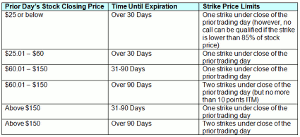As we get closer to income tax filing time, traders should pay attention to tax consequences of certain trades, and Michael Thomsett of ThomsettOptions.com shares tips on how covered call writers can avoid nasty tax surprises.
Traders have many misconceptions about options in general, but when it comes to the federal tax rules, the misconceptions are even greater. This is due to the complexity and seemingly illogical rules governing how covered calls—and profits on the underlying stock—get taxed.
The “unqualified covered call” refers to a special rule stating that under some conditions, a stock will be taxed at short-term rates if a call is opened too deep in the money. If you own stock and write a deep ITM call, the count to the one-year holding period for long-term gains rates is tolled. If the call is exercised after the stock has been owned more than a year in this situation, the stock is taxed at ordinary, short-term rates.
The following table explains how a covered call has to be opened to be considered as a “qualified” covered call:
Some Important Points to Remember1. The qualification call does not prevent you from writing such calls. Some traders mistakenly believe that the IRS has outlawed unqualified covered calls, and that is not the case.
2. The restriction does not affect your tax liability if you have a large carryover loss. Gains—short-term or long-term—are offset against the carryover. In fact, the carryover presents some interesting possibilities involving unqualified covered calls, because the gains are “sheltered” by the losses from past years.
3. Options tax rules should be examined and understood completely before entering any positions. This should not stop you from using options, but reviewing the rules in advance helps to avoid some unpleasant surprises.
The reason for the qualified/unqualified rule was to prevent traders from timing profits and losses to avoid taxes in the current year. Combined options strategies can include profits offset by losses and it is possible to set up current year losses and future year profits. Unfortunately, this has made option-specific tax rules among the oddest and most complex in the system. The rules are equally complex for any other straddles or spreads involving offsets, so it is not just covered calls that are complicated, but potentially any multi-option or option-stock strategy.
By Michael Thomsett of ThomsettOptions.com











